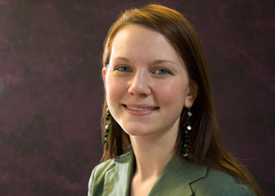|
|
Sources: Janna Sorensen, jannas@k-state.edu;
and Robert Garcia, 785-532-2044, rgarcia@k-state.edu
Photo available. Contact media@k-state.edu or 785-532-6415.
News release prepared by: Kristin Hodges, 785-532-6415, khodges2@k-state.edu
Thursday, March 5, 2009
K-STATE STUDENT FROM SYLVAN GROVE RESEARCHES, RAISES AWARENESS ABOUT HEARING LOSS IN AGRICULTURAL WORKERS
MANHATTAN -- Janna Sorensen noticed that a disability was becoming a trend in her family of farmers. The Kansas State University senior in communication sciences and disorders turned her curiosity into a research project that would not only benefit her family, but other agricultural workers also affected.

"I grew up on a farm and just about every male member in my family has hearing loss. I wanted to look into that," said Sorensen, who is from Sylvan Grove. "I kind of knew why that was -- they spent long hours on the tractor and around loud machinery -- but I wanted to get some facts."
Sorensen worked on the project under the guidance of Robert Garcia, audiologist and research assistant professor of family studies and human services at K-State. Her project, which aims to create awareness about hearing loss in agricultural workers, began two years ago as her honors project for the K-State College of Human Ecology's honors program.
Public education projects were typical during Sorensen's youth when she was a member of 4-H. She wanted to create another such project at K-State about hearing conservation and the importance of agricultural workers wearing hearing protection.
She researched the disability's effects on agricultural workers and created Internet files that include the recommended noise-level exposure per day per agricultural equipment. The files also offer questions to help people determine if they suffer from hearing loss. The files are available K-State's Agricultural Safety and Health Program Web site, http://www.oznet.ksu.edu/agsafety/
Sorensen also worked with K-State Research and Extension to develop documents on hearing conservation that extension agents can order and distribute. The documents will be available in May.
Garcia said Sorenson's project provides user-friendly information for one of the leading health risks affecting agricultural workers.
"When an individual suffers a hearing loss, quality of life is impacted in a negative way," Garcia said. "Hearing loss impacts the individual's ability to communicate with family, friends, work associates and others in the community."
In Sorensen's document, she highlights some of the popular myths of hearing loss.
"There are many myths out there," she said. "For instance, some farmers think that they can't hear their machinery if they wear earplugs, and that's not necessarily the case. They just need to get used to the way the machinery sounds with earplugs in. Earplugs don't block all the sound -- they just bring it down to a safer level so you can still hear the changes in the machinery."
Sorensen said she thinks many agricultural workers have never been educated about the importance of earplugs, which can be key in hearing conservation.
"It wasn't something their elders did or taught them," she said. "Their elders passed on great knowledge and expertise to them, and farmers are well-educated professionals in their field, but hearing conservation is not a big priority and is rarely discussed."
Hearing loss is a progressive loss, and many farmers start losing their hearing early on and don't realize it, Sorensen said.
"It keeps getting progressively worse and worse, and it's not until they're 50 or 60 that is starts affecting them socially. By that time it's too late; it's irreversible," she said.
Sorensen plans to pursue graduate studies in audiology, though she is undecided if she will study clinical audiology or work toward a research career in the field. She also plans to work overseas, where she hopes to eventually spend a couple years in Australia because she enjoyed her study abroad experience in New Zealand.
While at K-State, Sorensen has served as vice president of the Boyd Hall Governing Board, president of Silver Key sophomore service honorary, social chair for the National Society of Collegiate Scholars and president of the K-State Student Speech Language and Hearing Association. She also has been a member of K-State's Association of Residence Halls and Chimes, the junior honor society.
A 2005 graduate of Sylvan Unified High School, she is the daughter of Gary and Ruth Sorensen, Sylvan Grove.